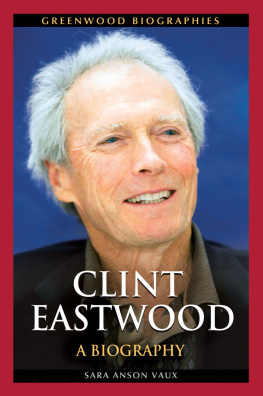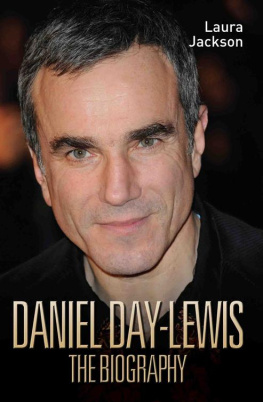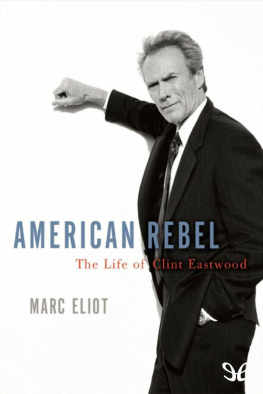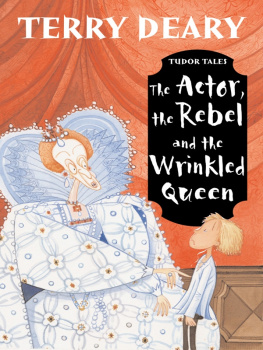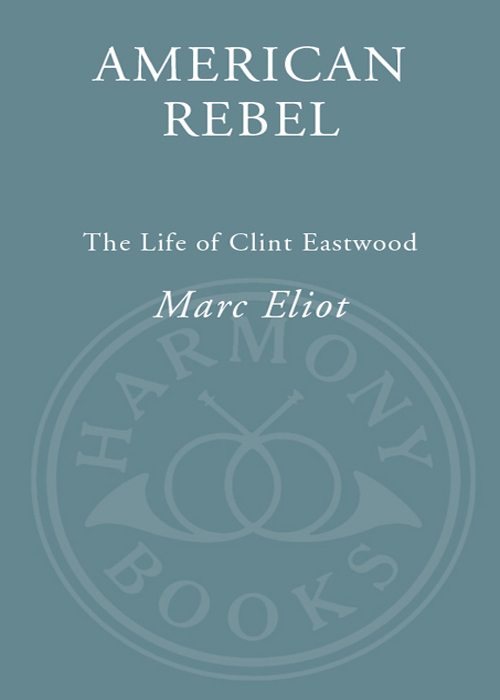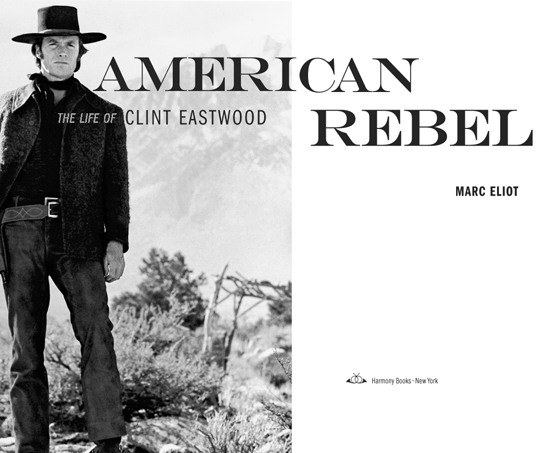ALSO BY MARC ELIOT
Reagan: The Hollywood Years
Jimmy Stewart: A Biography
Cary Grant: A Biography
Song of Brooklyn: An Oral History of Americas Favorite Borough
Death of a Rebel: Starring Phil Ochs and a Small Circle of Friends
Down Thunder Road: The Making of Bruce Springsteen
Roconomics: The Money Behind the Music
Walt Disney: Hollywoods Dark Prince
The Whole Truth
To the Limit: The Untold Story of the Eagles
Down 42nd Street: Sex, Money, Culture, and Politics at the Crossroads of the World
For XIAOLEI
You go to an Eastwood movie with definite expectations. From the comically crude to the gentler epithets of his later films, you know what youre going to get and, even more important, what youre not going to get. Youre not going to get everything.
Molly Haskell
Clint Eastwood is a tall, chiseled piece of lumbera totem pole with feet Eastwood seems to be chewing on bullet casings.
James Wolcott
Eastwood has a particular grace, every inch that of a star, in the old sense the taut, lean, powerfully built body, the sensitively chiseled unsmiling face, a voice surprisingly soft, the shock of tawny hair, the lithe walk (the most distinctive of any actors since Fondas), the famous squint and glacial eyes which produce a certain inarticulate melancholy.
Robert Mazzocco
People can know him for years and never be sure of what hes thinking. Hes one of the warmest people in the world, but theres a certain distance, a certain mystery to him.
Sondra Locke
There is something intransigently irreducible in Eastwood, some corner of his soul that no shrink can penetrate Clint Eastwood is an interesting screen personality because his essence is more interesting than his existence. The screen functions to freeze life styles into myth rather than to adjust life forces into art. The beauty of actors is that they are basically vain enough and stupid enough to allow themselves to be embalmed for the edification of their audience.
Andrew Sarris
Im an actor playing roles; all of them and none of them are me.
Clint Eastwood
CONTENTS
PART I:
PART II:
PART III:
INTRODUCTION
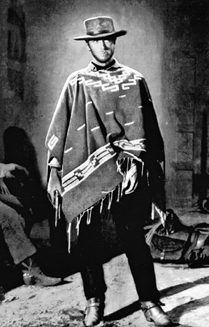
I grew up watching movies in an era when there wasnt even television, nothing else even to listen to. I was shaped by John Ford, Howard Hawks, Preston Sturges, those were the guys, plus a ton of other people we dont know the names of who made B movies.
Clint Eastwood
C lint Eastwood stands tall among the most popular and enduring stars Hollywood has ever produced. He has been making movies for more than fifty years, ranging from small, meaningless, and forgettable parts as a Universal Studios contract player to acting in, as well as producing and directing, many Oscar-caliber blockbusters that will one day, sooner rather than later, take their place among the best-loved American movies.
Early in his career, Clint spent seven and a half years costarring in TVs Rawhide, and his Rowdy Yates became one of the most popular TV cowboys of the late 1950s and early 1960s. By the time Rawhide ended its eight-season run he had also become an international movie star, following his appearance in three wildly popular spaghetti westerns made and distributed throughout Europe; when they were finally released in America, they made him a big-screen star in the States as well. For the next quarter-century Clint appeared in dozens of entertaining movies that made him a household name anywhere in the world that films could be seen. He was undoubtedly a crowd-pleaser, but at the time the Hollywood elite considered his movies too genre-heavy to be Oscar-worthy.
Then in 1992 Clint produced, directed, and starred in Unforgiven, a western to (literally) end all westerns, made by his own production company, Malpaso, that he had created to operate as a ministudio in the service of its resident star. Unforgiven won four Academy Awards, including two for Clint (one for Best Director and one for Best Picture), and the Midas-touch Oscar-style was suddenly his; nearly everything he made for the next fifteen years was deemed award-or nomination-worthy by the Academy, including Million Dollar Baby, Mystic River, Flags of Our Fathers, Letters from Iwo Jima, and Changeling. Throughout Hollywoods post-studio era, the first rule of filmmaking has been that youth equals box officeyoung people go out to the movies, older audiences stay home and watch them on cable and DVD. It is, therefore, even more remarkable that he made all of these movies past the age of sixty.
P erhaps more than for any other Hollywood star, the double helix that is Clints creative and real-life DNA is so intertwined it is nearly impossible to separate the off-screen person from the on-screen persona. The two feed off each other so thoroughly, it is often difficult to tell where the lives of the characters in his movies end and the life of the man playing them begins.
In the movies that he has thus far acted in, produced, or directed, in various combinations wearing one or more of these hats, three essential Clint Eastwood screen personae continually reappear. The first is the mysterious man without a past who is resolute in his loneness, the Man with No Name, who appeared in the three Sergio Leone westernsA Fistful of Dollars, For a Few Dollars More, The Good, the Bad and the Uglythen reappeared slightly altered in Hang Em High and The Outlaw Josey Wales, and took several other guises and variations all the way through to Unforgiven. The second persona is Dirty Harry Callahan, whose essentially nihilistic loner personality continually reemerges up to and including Gran Torino. And finally, there is the good-natured redneck, who uses his fists the way a more thoughtful person uses words and who makes his first appearance as Philo Beddoe in Every Which Way but Loose and returns again and again on the way to Pink Cadillac.
All three characters in their various incarnations are viscerally connected to the real-life Clint. All three are quintessential loners, unlike any other in the canon of American motion pictures. The other cinematic men alone who most immediately come to mind are not really loners at allthat is to say, they are loners Hollywood style, buffered with the idealized images of the actors who played them. Probably mainstream films greatest loner is Gary Cooper as the isolated sheriff in Fred Zinnemanns High Noon (1952). Yes, Will Kane heroically stands alone to face his enemies, but in truth he is not alone at all, as in the end he relies on the love of his wife, and her reluctant use of a gun that saves his life; and when all the fighting has ended, the two of them ride off together into the sunset. Another who comes to mind is Humphrey Bogarts Rick Blaine, the neutral American caught in the crosswinds of World War II in Michael Curtizs Casablanca (1942). He proudly boasts that I stick my neck out for nobody and then does precisely that for the woman he loves, in this case Ingrid Bergman, in an act so unselfishly noble that the very idea that he was ever a loner is so absurd it becomes laughable. James Bond appears to be the ultimate loner, but we now know that he lost his one true love early on and both seethes with revenge and longs with lust, no longer for any single woman but, apparently, all of womankind. On a nobler plane, Charlton Heston in Cecil B. DeMilles


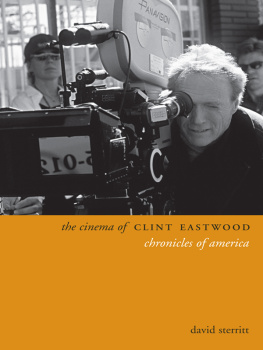
![Captain Chesley B. Sullenberger III - Sully [Movie Tie-In] UK: My Search for What Really Matters](/uploads/posts/book/404353/thumbs/captain-chesley-b-sullenberger-iii-sully-movie.jpg)

